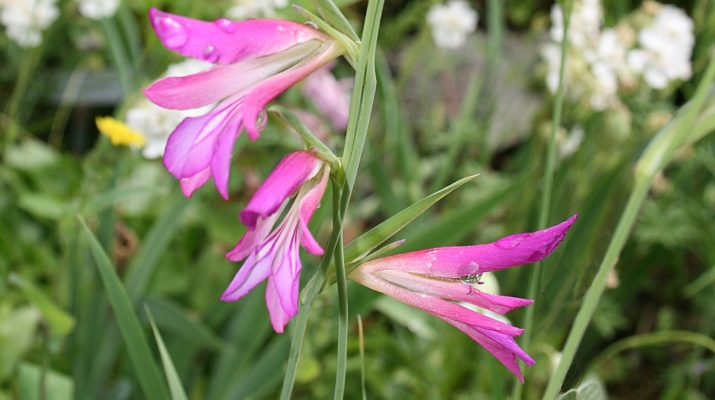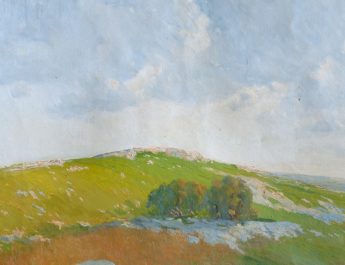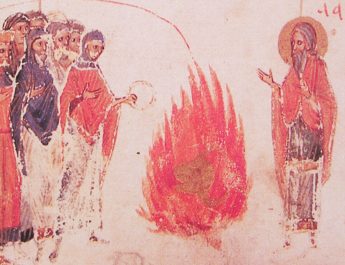Matthew 6:25-33
Thanksgiving B
25 “Therefore I tell you, do not worry aboutA your life,B what you will eatC or what you will drink,D or about your body,E what you will wear.F
A “worry about” = merimnao. 19x in NT. From merimna (care, worry, anxiety; being separated from the whole); from merizo (to divide, part, share, distribute, assign; figuratively, to differ); from meros (part, share, portion figurative or literal); from meiromai (to get your share, receive one’s allotment). This is to be anxious, distracted, or care for. It is being pulled in different directions – usually a negative.
B “life” = psuche. From psucho (to breathe, blow). This is breath, the breath of life, the self, individual, soul. This is the word for that which makes a person unique – their identity, will, personality, affections. This isn’t the soul as the immortal part of us, but as our individuality. It is also not life as a general concept, but specific to people. This is where the words psyche and psychology come from.
C “eat” = phago. This is to eat or figuratively to consume like rust does.
D “drink” = pino. This is to drink, literally or figuratively.
E “body” = soma. Perhaps from sozo (to save, heal, rescue); from sos (safe, well, rescued). This is body or flesh. It can be body in a literal or figurative sense (as the body of Christ). This is where the word “somatic” comes from.
F “wear” = enduo. From en (in, on, at, by, with, among) + duno (to sink into, set like the sun); {from duo (to go down, sink, or set)}. This is to put on as when one puts on clothes. It is the idea of sinking into one’s clothing.
IsG not life moreH than food,I and the body more than clothing?J
G “is” = eimi. This is to be or exist.
H “more” = pleion. From polus (much, many, abundant). This is many, more, great, having a greater value, more excellent.
I “food” = trophe. 16x in NT. Perhaps from trepho (to bring up, rear, nourish, fatten, nurse; properly, to enlarge through proper nourishment). This is nourishment in a literal or figurative sense. By implication, it can be ration or wages.
J “clothing” = enduma. Related to “wear” in v25. 8x in NT. From enduo (see note F above). This is clothing, especially outer robes. This is clothing as something one sinks into.
26 LookK at the birdsL of the air;M they neither sowN nor reapO nor gatherP into barns,Q
K “look” = emblepo. 12x in NT. From en (in, on, at, by, with) + blepo (to see, used primarily in the physical sense; figuratively, seeing, which includes attention and so to watchfulness, being observant, perceiving, beware, and acting on the visual information). This is to look at, gaze, consider, stare, see clearly, look with particular interest.
L “birds” = peteinon. 14x in NT. From petomai (to fly). This is bird or something with wings.
M “air” = ouranos. May be related to oros (mountain, hill) with the notion of height. This is the air, the sky, the atmosphere, and heaven. It is the sky that is visible and the spiritual heaven where God dwells. Heaven implies happiness, power, and eternity.
N “sow” = speiro. Probably from spao (to pull or draw like one draws a sword). This is sowing a seed or scattering. It is sowing in a literal or figurative sense.
O “reap” = therizo. From theros (summer; the heat, which implies summer); from thero (to heat). This is to gather or harvest.
P “gather” = sunago. From sun (with, together with, closely associated) + ago (to lead, bring, carry, guide, go, drive). This is to lead together and so to assemble, bring together, welcome with hospitality, or entertain. In the sense of assembly, this is the root of the word “synagogue.”
Q “barns” = apotheke. 6x in NT. From apotithemi (to put aside, put away, renounce); {from apo (from, away from) + tithemi (to put, place, set, fix, establish in a literal or figurative sense; properly, this is placing something in a passive or horizontal position)} This is somewhere that things are stored like a barn or repository.
and yet your heavenlyR FatherS feedsT them. Are you not of moreU valueV than they?
R “heavenly” = ouranios. Related to “air” in v26. 9x in NT. From ouranos (see note M above). This is heavenly or celestial. It can mean in, belonging to, or coming from heaven or the sky.
S “Father” = Pater. This is father in a literal or figurative sense. Could be elder, senior, ancestor, originator, or patriarch.
T “feeds” = trepho. Related to “food” in v25. 9x in NT. See note I above.
U “more” = mallon. This is rather, more than, or better.
V “value” = diaphero. 13x in NT. From dia (through, because of, across, thoroughly) + phero (to bear, bring, lead, make known publicly; to carry in a literal or figurative sense). This is to carry through as in all the way to the end. It is differing or fully distinguishing – separating by comparison. Literally, it means transport – figuratively it can mean report or surpass.
27 And canW any of you by worrying addX a singleY hourZ to your span of life?AA
W “can” = dunamai. This is to be able, or something that is possible. It can also be empowered or being powerful. The Greek word for “miracle” (dunamis) comes from this root.
X “add” = prostithemi. Related to “barns” in v26. 18x in NT. From pros (at, to, toward, with) + tithemi (see note Q above). This is to add, place to, bring together for a reason, or add up.
Y “single” = heis. This is one, a person, only, some.
Z “hour” = pechus. 4x in NT. This is forearm or cubit, a unit measuring around a foot and a half.
AA “span of life” = helikia. 8x in NT. From the same as helikos (of what size, how much; properly, full grown, an adult); from helix (mature, adult, of the same age). This refers to maturity, stature, life span, or being of a suitable age. It could refer to maturity in terms of years or size.
28 And why do you worry about clothing? ConsiderBB the liliesCC of the field,DD how they grow;EE they neither toilFF nor spin,
BB “consider” = katamanthano. 1x in NT. From kata (down, against, according to) + manthano (to learn key facts, gain knowledge from experience; generally implies reflection as part of the learning process); from math– (thinking things through). This is to consider carefully, learn precisely, grasp conclusively, understand, observe.
CC “lilies” = krinon. 2x in NT. This is a lily, perhaps a red anemone or sword lily.
DD “field” = agros. This is a field as a place where one grows crops or pastures cattle. It can also refer to a farm or lands. This is one of the roots of “agriculture.”
EE “grow” = auxano. From auksano (to grow or enlarge, whether literal or figurative). This is growing whether in size or mature or greatness or some other metric.
FF “toil” = kopiao. From kopos (labor that leads to exhaustion, depletion, weariness, fatigue; working until worn out); from kopto (to cut, strike, cut off; beating the chest to lament and so to mourn). This is working with effort, whether of the body or mind, growing weary, feeling tired, working hard.
29 yet I tell you, even SolomonGG in all his gloryHH was not clothedII like oneJJ of these.
GG “Solomon” = Solomon. 12x in NT. From Hebrew shelomoh (Solomon, meaning “peaceful”); from shalam (to be complete or sound; to have safety mentally, physically, or extending to one’s estate; so, if these things are safe and complete, the implication is that one would be friendly; and, if being friendly, one would make amends and that friendship would be reciprocated). This is Solomon, meaning “peaceful.”
HH “glory” = doxa. From dokeo (to have an opinion, seem, appear, suppose; a personal judgment; to think); from dokos (opinion). This is literally something that evokes a good opinion – something that connects to our understanding of intrinsic worth. The ultimate expression of this is, of course, God and God’s manifestation. So, this is opinion, honor, and dignity, but also praise, glory, renown, and worship.
II “clothed” = periballo. From peri (about, concerning, all around, encompassing) + ballo (to throw, cast, place, put, drop). This is to thrown around, clothe, array, put on.
JJ “one” = heis. Same as “single” in v27. See not Y above.
30 But if GodKK so clothesLL the grassMM of the field, which is aliveNN today and tomorrow is thrownOO into the oven,PP will he not muchQQ more clothe you—you of little faith?RR
KK “God” = Theos. From Proto-Indo-European origins, meaning do, put, place. This is God or a god in general.
LL “clothes” = amphiennumi. 4x in NT. From the same as amphoteroi (both, around, all) + hennumi (to clothe, invest). This is to put on, clothe.
MM “grass” = chortos. 15x in NT. This is food, grass, hay, wheat. It can also be a place of feeding, garden, court, or pasture.
NN “is alive” = eimi. Same as “is” in v25. See note G above.
OO “thrown” = ballo. Related to “clothed” in v29. See note II above.
PP “oven” = klibanos. 2x in NT. This is oven or furnace for baking.
QQ “much” = polus. Related to “more” in v25. See note H above.
RR “of little faith” = oligopistos. 6x in NT– 5 in Matthew & 1 in Luke. From oligos (few, small, short, brief, puny) + pistis (faith, faithfulness, belief, trust, confidence; to be persuaded or come to trust); from peitho (to have confidence, urge, be persuaded, agree, assure, believe, have confidence, trust). This is of little faith – incredulous, lacking confidence.
31 Therefore do not worry, saying, ‘What will we eat?’ or ‘What will we drink?’ or ‘What will we wear?’ 32 For it is the GentilesSS who strive forTT all these things; and indeed your heavenly Father knowsUU that you needVV allWW these things.
SS “Gentiles” = ethnos. Probably from etho (a custom or culture). This is people who are united by having similar customs or culture. Generally, it is used to refer to Gentiles. This is a tribe, race, nation, or Gentiles in general. This is where the term “ethnicity” comes from.
TT “strive for” = epizeteo. 13x in NT. From epi (on, upon, against, what is fitting) + zeteo (to seek, search for, desire. searching for something by inquiring or investigation; to seek in a literal or figurative sense; to worship God). This is to desire, search for, seek, or want. It is following through on a personal goal by seeking.
UU “knows” = eido. This is to know, consider perceive, appreciate, behold, or remember. It means seeing with one’s eyes, but also figuratively, it means perceiving – seeing that becomes understanding. So, by implication, this means knowing or being aware.
VV “need” = chrezo. 5x in NT. From chre (what is proper, fitting, or necessary); from chraomai (to use, make use of, give what is needed, act in a specific way, request); related to chre (what is proper, fitting, or necessary). This is to need, want, desire.
WW “all” = hapas. From hama (at once, together with) +pas (all, every, every kind of) OR from a (with) + pas (see above). This is all; every part working together as a unit.
33 But striveXX first for the kingdomYY of God and his righteousness,ZZ and all these things will be givenAAA to you as well.
XX “strive” = zeteo. Related to “strive for” in v32. See not TT above.
YY “kingdom” = basileia. From basileus (king, emperor, sovereign); probably from basis (step, hence foot; a pace); from baino (to walk, to go). This is kingdom, rule, authority, sovereignty, royalty, a realm.
ZZ “righteousness” = dikaiosune. From dikaios (correct, righteous – implies innocent; this is that which conforms to God’s notion of justice, uprightness); from dike (the principle of justice; that which is right in a way that is very clear; a decision or the execution of that decision; originally, this word was for custom or usage; evolved to include the process of law, judicial hearing, execution of sentence, penalty, and even vengeance; more commonly, it refers to what is right); may be from deiknumi (to show, point out, exhibit; figurative for teach, demonstrate, make known). This is judicial or divine approval of character or action. This is righteousness, justice, justness, divine righteousness.
AAA “given” = prostithemi. Same as “add” in v27. See note X above.
Image credit: “Italian Gladiolus” by Jean-Pol Grandmont, 2010.




